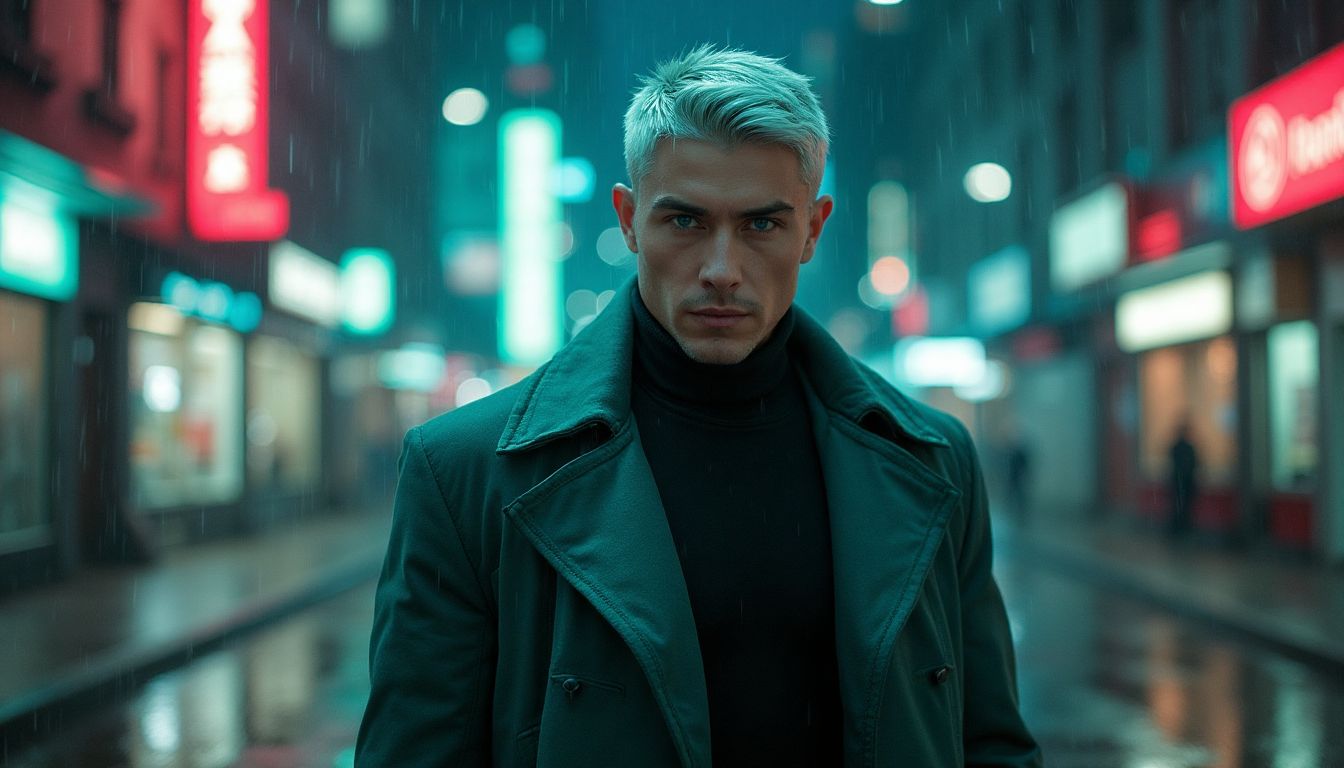He sat on the rooftop, denim jacket stiff with city grime, cobalt scarf fluttering like an old flag. The skyline pulsed below him—neon veins crisscrossed steel-and-glass arteries, casting fractured reflections into Lake Ontario. From up here, even Toronto's hunger for real estate looked beautiful. But to Mateo Reyes, tonight, the city was quietly swallowing another soul: his own.
Sirens flared in the distance, red strobes igniting the clouds like fireworks of despair. Mateo swung his legs over the edge of the twelve-story walk-up on Gerrard Street East. Rent had just gone up again—$2,750 for a 400-square-foot shoebox with cracked tiles, unreliable plumbing, and a landlord who'd rather gut the place than fix a leak.
He'd tried everything. Gig work in the day, warehouse shift at night, DoorDash in between—but the numbers never added up. Fifty grand a year was supposed to mean freedom once. But the moment his son Eliot turned six and his ex demanded more child support, the 'budgetable' dream collapsed like drywall behind black mold.
He looked down. Crowds funneled toward the streetcars. The 506 screeched to a halt, coughing up bodies burdened by bags and invisible debts. He smiled bitterly. Midday articles called this city a hub of opportunity. They never interviewed the dishwashers. Or the Uber drivers. Or the burned-out temps who replaced human resources departments that used to be human. Now even thoughts were automated. Even pain felt like it was part of the algorithm.
Mateo lit a cigarette. He hadn’t smoked in five years. But nostalgia was cheaper than RentSafe certification.
His phone buzzed—a line of texts from Elias, his best friend since community college. “You good?” the last message glowed. He ignored it. What was there to say?
The city's heat whispered summer, but air clung cold tonight. His scarf—a gift Eliot had woven at school—shimmered in ethereal blue, like a digital trace misplaced in analog existence. He remembered the scarf stark against a dark sky, even though it was only cotton and memory. Once, a teacher had told Mateo about chromesthesia, the blending of color and emotion. Maybe that’s why he wrapped himself in electric blue bittersweetness every night.
Footsteps behind him.
“You really gonna jump, Reyes?”
Mateo flinched.
It was Andre, the landlord's son—one of those real estate golden boys in a tailored navy pea coat, pressed slacks, and shoes that cost more than Mateo’s last month’s rent. He held a clipboard like a weapon. “You’re behind again. I’ve got buyers lined up. Prime lot for a condo reno.”
Mateo didn’t get mad. He didn’t beg either.
He turned to Andre, chin high. “You ever live on fifty grand in a city this expensive?”
Andre laughed. “Fifty? That’s not even my Uber budget.”
“Thought so,” Mateo replied.
Then, something changed—like a shutter clicked inside Mateo’s chest. Gravity was no longer downward. It was forward. He stepped off the ledge—not to fall, but into something else.
The rooftop vanished.
Suddenly he stood in front of the Immigration Services building on College Street—but it was 2012. His first morning in Toronto. Mateo had arrived from Manila, wearing the same cobalt-patterned scarf, fists clenched with hope. He had a suitcase, a bottle of water, and ambition that felt bulletproof.
The Toronto sun that day was glowing with promise. Then it shifted. He blinked.
Now it was 2016. Mateo was arguing with his ex in front of the Holy Chuck Burgers on Yonge. “I’m trying, Ana,” he’d pleaded. “What do bills know about trying?” she'd snapped.
Flash. 2019. Eliot’s face during their last affordable weekend at Ripley’s Aquarium. A storm of jellyfish behind glass, glowing—just like this scarf. Just like home. Just like purpose.
Flash. 2023. Mateo standing outside Freedom Mobile, negotiating a new phone plan while Eliot waited inside reading a Spider-Man comic. Rent was late. Again. But somehow, they'd made it work.
And now he was back.
On the rooftop.
Andre gone. The clipboard gone. The drone of gentrification faded into ambient hums of streetcars and jazz from a bar down the alley.
Mateo stood up.
He took one last drag and tossed the cigarette into the dark. Time, he realized, wasn’t a line. It was a breathing city. Some parts of you never leave their intersections. Some parts of you renovate. But as long as you could still see the blue in the dark… you weren’t done.
He walked down the fire escape, two floors at a time.
On the fourth landing, he called Elias back. “You still need help with that AI app for people stuck on low incomes?”
“You serious?” Elias asked.
“Deadass.”
“Bro, I thought—”
“I’m done thinking. Let’s build something.”
That night, Mateo didn’t sleep.
Over ramen and olive crackers, he sketched UI wireframes for a budgeting app named SCARF: Smart City Aid & Rent Forecast. It would gamify poverty without mocking it. Offer real-time budgeting. Re-align people with precision savings and cash flow heat maps. Make navigating Toronto on 50k feel survivable. Maybe even dignified.
Years later, the app would go viral (thanks to Eliot’s teenage TikTok army). Mateo would wear a black coat instead of denim. But on every version of the app, the core interface glowed cobalt blue.
And on holiday cards sent by anxious freelance illustrators and single fathers, one quote always appeared just below the QR code:
“I made it work. So can you.” – Mateo Reyes
Genre: Magical Realism / Slice of Life / Techno-Parable
The Source...check out the great article that inspired this amazing short story: Is $50,000 a good salary in Toronto
Disclaimer: This article may contain affiliate links. If you click on these links and make a purchase, we may receive a commission at no additional cost to you. Our recommendations and reviews are always independent and objective, aiming to provide you with the best information and resources.
Get Exclusive Stories, Photos, Art & Offers - Subscribe Today!

























Post Comment
You must be logged in to post a comment.